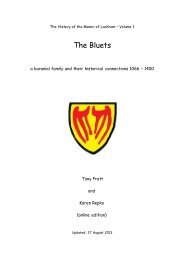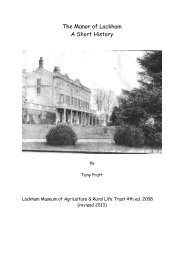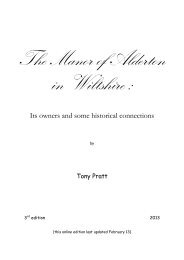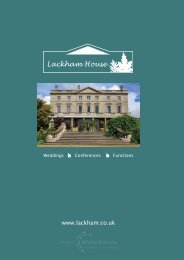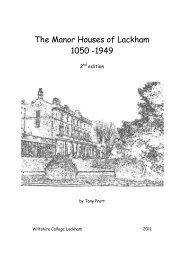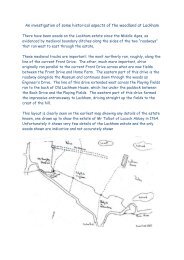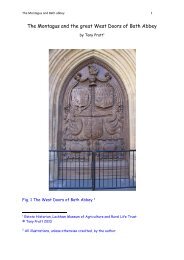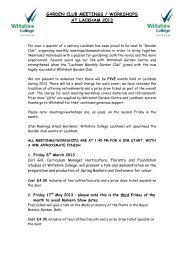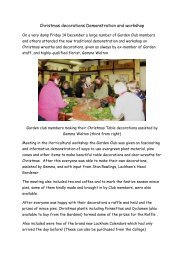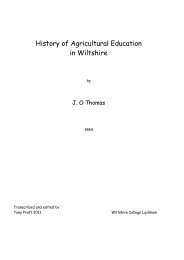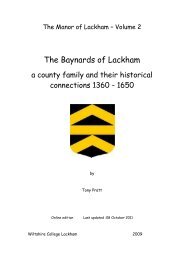Vol 3 - Lackham Countryside Centre
Vol 3 - Lackham Countryside Centre
Vol 3 - Lackham Countryside Centre
You also want an ePaper? Increase the reach of your titles
YUMPU automatically turns print PDFs into web optimized ePapers that Google loves.
The Manor of <strong>Lackham</strong> <strong>Vol</strong> 3 : The Montagu family<br />
Henry Montagu and that James had agreed that he would not take<br />
advantage of the deed and had refused to deliver up the deed to Edward.<br />
In 1654 James issued a petition to the supreme authority of Parliament of<br />
the Commonwealth of England' asking for ‘relief from vexatious suits to<br />
which he was, as he alleged, subjected by the earl’. Reference is made in<br />
James’ petition to “'that most destructive statute to your petitioner anno<br />
32 h 8” 189 . Why this statute was unhelpful to James is unclear as it would<br />
seem to be the act that allowed Henry to give land to anyone other than<br />
Edward 190 . At the foot of the petition is a note by Lisle Long, which says<br />
that it is “his higness' pleasure 191 that the earl should be made acquainted<br />
with the petition and desired to return what answer thereunto he judges<br />
meet within some convenient time” 192 . The answer given, and the result of<br />
the petition, is unknown.<br />
It is possible, although not certain, that the problem late in James’ life –<br />
in 1664, only a year before his death – are related to this dispute, but<br />
again this is unclear. Whether it was or not, in 1664 James was detained<br />
in the King’s Bench prison. It is not certain why he was there; he seemed<br />
to think that it was to do with an allegation that he would not live with his<br />
189 Chronological Table and Index of the statutes 3rd ed 1874 p46 32 hen 8 1540 c1<br />
Wills<br />
190 http://en.wikipedia.org/wiki/Statute_of_Wills<br />
The Statute of Wills (32 Hen. 8, c. 1 - enacted in 1540) was an Act of the Parliament of<br />
England. It made it possible, for the first time in English history, for landholders to<br />
determine who would inherit their land upon their death by permitting bequest by will.<br />
Prior to the enactment of this statute, land could be passed by descent only if and when<br />
the landholder had competent living relatives who survived him, and it was subject to<br />
the harsh rules of primogeniture. When a landholder died without any living relatives,<br />
his land would escheat to the Crown. The statute was something of a political<br />
compromise between Henry VIII and English landowners, who were growing increasingly<br />
frustrated with primogeniture and royal control of land.<br />
191 Note that, as this was in 1654, “his highness’ “ was the Lord Protector, Oliver<br />
Cromwell<br />
192 Huntingdon archives 2091/625<br />
51



